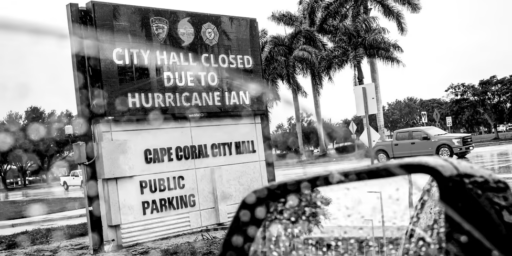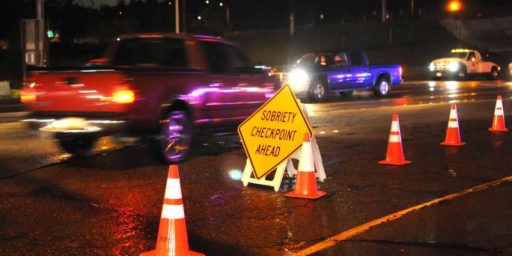Where’s the Evidence that the NSA Programs are Working?
Julian Sanchez concludes his column (The War on Terror’s Jedi Mind Trick) on the NSA’s collection of phone data thusly:
While we may sometimes have to trade a bit of privacy for greater security, the Review Group rightly argues that we must demand evidence that we are really getting that security, relying on rigorous cost-benefit analysis rather than dramatic anecdotes. After a decade of bogus claims that intrusive programs are necessary to keep us safe, it is high time for Americans and lawmakers to stop being played for suckers.
This echoes something I have been arguing since back in the Bush administration: if these policies actually worked the way they are supposed to, there would be any number of successes for the administration to point. Instead, we get assurances that the policies are efficacious, but no evidence is actually provided to prove it.
The whole column is worth a read.






Much like Stop and Frisk, they, also, have not evidence of refining the program to reduce the false or erroneous collection/stops. We’d have more faith if they showed some progress other than collect everything and put no effort into sorting things out.
Steven,
I hear your concern, but the nature of programs like spying / security operations is that publishing successes (or failures) can reveal more than the spies wish to be released – trumpeting a successful operation may yield valuable information to the intended targets in how to change their methods in the future. Reporting a successful operation may reduce the likelihood that a similar method will be successful in the future.
That’s not to say that I’m totally behind the NSAs methods. I understand the need and desire for programs such as Snowden revealed, but I’m also troubled by some of the tactics.
A bright fella from St. Paul said something about holding opposing opinions at the same time. I like his work and I’m not going to contradict him.
Snowden is both terribly naive and a brave whistle blower. Some of the NSA’s data collection practices are terribly intrusive and also necessary. People who expect absolute privacy in moniterable (neologism?) communications are both championing freedom and are incredibly foolish.
Greenwald may have convinced himself that he is in it for all the right reasons, but in my opinion about 95% of what he does is self-aggrandizement.
I don’t really understand the absolutists on either side of this issue. In my head, if you’re not conflicted on this issue – well, everyone should be conflicted on this issue to some extent.
@de stijl:
This is true and is the typical retort. However, I find it very difficult to believe that there is not some way for the government to share successes in some way if these programs are as necessary and efficacious as the government makes them out to be.
I can accept the notion that some level of surveillance is necessary, and I fully understand that absolute privacy does not (and cannot) exist. Still, in general I find that whether we are talking the TSA, the NSA, Guantanamo, or any number of WoT policies that there are a lot of assertions about how necessary they are and precious little in the way of evidence of their efficacy.
I’m a tad surprised the terrorists haven’t been using carrier pigeons the whole time.
Think about it: you’ve already dedicated your life to snuffing out the Great Satan. Why, then, do you feel it’s a hindrance to your [dedicated] life to train pigeons if this incredible analog solution bypasses all the high-tech wizardry of your avowed foe?
@Steven L. Taylor:
Both true and typical? You’re living Fitzgerald’s dream! 🙂
What would you propose? What changes to the FISA process? How and when to publicize successes (or failures)? I can easily see structural changes in oversight, but publicly disseminating such information could be very problematic.
I guess you don’t have to answer my earlier questions about oversight (FISA, etc.) – I think we can all agree that we need a robust, independent and persistent oversight regime. The big question is public transparency – of both the methods and the results.
@de stijl:
Indeed.
And my point of evidence isn’t so much that I expect full transparency. I just think that they owe the public evidence of success. Further, I believe that if such evidence existed, they would find a way to disseminate it, as it would be the politically expedient thing to do. I take the lack of any evidence to mean that it likely does not exist, which leads me to question the need for the policies in question.
At a minimum, I highly doubt that we are all being made safer.
@Tillman:
That´s why it took so long to catch Bin Laden: he only used messengers to communicate. That´s also why there were so many losers that were catch trying to organize terrorist attacks on the internet.
@Steven L. Taylor:
It would indeed be extraordinarily politically expedient to do so. And yet, we’re not seeing it. One would think that we would see more of it.
Manufacturing false successes would be pretty easy – albeit with the chance that a whistle-blower will rat ’em out.
I think it really boils down to what you earlier called “true and typical” – publicizing intelligence success thwarts further success.
I don’t see an easy way to say “We did this thing we can’t talk about that may have saved some American lives / preserved American interests, but we can’t say very much about how we did it.”
I think I was too hasty in casually dismissing oversight – I was all “we need more and better blah blah blah…”
But publicizing success / transparency on means and methods may be the red herring here.
Perhaps if we pursued a much more stringent oversight and openly talked about what that oversight does and how it does it and how it measures success. Stronger and more transparent watchers of the watchers. As opposed to publicly saying here’s what are spooks are doing, how they’re doing it, and who they’re watching.
Maybe a new Church Committee.
But I don’t see how a new Church Committee happens politically – it would take an opposition controlled House and Senate, and that opposition party strongly disagreed with what the President’s administration was doing in the WoT. I think that would take both a Democratic House and Senate that was strongly opposed to what the Republican President was doing and how he / she was doing it, or vice versa.
And 21st century Republicans are fairly authoritarian by nature so they may very well tacitly agree with a D President with a strong arm. And 21st century Democrats are scared silly of being branded soft on whatever you want to call this nasty state we’re in – witness the AUMF vote in 2001, “I was for it before I was against it”, Feingold’s departure, etc.
I think that the only way things get better in the near term is (seemingly) apolitical technocratic oversight reforms.
It is easy to imagine a world that’s a better place for you and me. No one to my knowledge is making the case that intrusive tracking of each of us and our electronic footprints is just a swell thing and aren’t we all happier now!?
The question is sadly, as it so often is, what is least bad? How smart do we want our policemen to be? If we grant that 9/11 created a huge incentive for political and national security people to assure us that nothing like that will ever, ever happen again, the lengths that a security force will go to in insuring that goal are stratospheric. In non-digital times, that was pretty messy and cruel. Think of WW2’s Japanese internment. The American citizens of ’41 had the same commitment to assuring themselves that Pearl Harbor would never ever happen again. And they realized you can’t make an omelet without breaking some eggs.
If the real, actual contrast we should focus on is digital data mining of information that has, after all, already been placed in third party hands, or real actual spying on everyone that could conceivably have some 2d or 3d degree contact with someone who might – just might – know someone who is plotting a terrorist attack the digital analysis begins to look a little better.
Like the Original Post, I wish there were evidence that the policy is working. There is a difference between a ‘defensible’ policy and good policy. But given what we know, I vote for a smart policeman.
I have no idea whether the programs are effective in the sense most people mean. But here’s part of the problem: just like TSA security at the airport, the goal is not just to catch bad guys, but to complicate life for bad guys.
If you’re a terrorist and you know that you cannot safely use any modern means of communication, and this causes you to use less efficient means, and you therefore accomplish less, then the NSA program works. Right? I mean, the goal is to reduce terrorism, and whether terrorism is reduced directly or indirectly is irrelevant.
This is awfully hard to quantify. It’s like when people sneer at TSA and say, “They’ve never caught a terrorist.” True. But with a little imagination you can put yourself in the mind of someone planning a complex mission like the 9-11 attack and realize that the TSA makes it effectively impossible. They don’t have to catch anyone. They don’t have to be great at what they do. They just have to fatally complicate matters for terrorist planners.
The surveillance also scares off potential allies. Let’s say you’re not a terrorist, but a sympathizer who would like to contribute to the cause by giving them a hundred grand. Tell me how you accomplish that when you know the NSA might be watching. It’s not impossible, but it’s a hell of a lot harder. And difficulty translates to paralysis.
On that basis, since I think privacy is mostly self-delusion, and since I think the outrage over this infringement is mostly for show and lacking substance, and since the essential issue is not the data but its misuse, I think logic is on the side of the NSA.
All that being said, the NSA has to deal openly and honestly with the Senate and House Intel committees, and the committees should not just act as rubber stamps.
Let’s the face it. In the end, a small (but noisy) bunch of civil libertarians care about this NSA stuff. Everybody else cares about not being blown up by crazed terrorists, and are willing to give the NSA broad discretion. You can survive a privacy violation: you can’t survive being on a plane exploding in flight. Even the most libertarian libertarian in Libertarianland is going to pick 1 over 2 if the odds are at all close.
Since that’s the political calculus, civil libertarians have an uphill struggle in these battles, since the public and the politicians answerable to them are going to give the intelligence agencies every benefit of the doubt.
Still and all, it does look like there are going to be some limitations on the NSA. Let’s see what Obama says next month.
@stonetools:
I think where we have to build the wall is between the data and any act pursuant to it that involves American citizens. If we could be certain that nothing obtained by these means could be presented as evidence in a US court, or be leaked to the media, and that any attempt at using the data for extortion would be severely punished, I’d be fine with it. It’s not the data, it’s the use of same for either prosecution or extortion.
@stonetools:
I’m not trying to be a dick about his, but please don’t equate civil libertarians with libertarians. I’ve been a proud ACLU member (i.e. I write a check every year) for 25 years or so. I’m a civil libertarian; I’m not a libertarian.
BTDubs: The wording of “Even the most libertarian libertarian in Libertarianland” was frickin’ awesome!
@JohnMcC:
How about a smart policeman with a smarter policewoman looking over his shoulder and a politically accountable Senate committee looking over her shoulder?
This the standard power grad BS. The cold war continued for 10 + years after it was over. Phony intelligence was drummed to keep the wheels of the defense contractors moving.
@stonetools:
The odds of being killed by a plane exploding during a terrorist attack are extremely small(It makes the chances of winning the lottery looks good). I´m afraid of anyone that supports ANY position because he/she is afraid of himself being killed by terrorists, that´s someone that need psychiatric help and that should have no access to firearms.
@Andre Kenji:
The odds of being harmed by an NSA guy reading my boring email is even smaller.
I’m not at all afraid of the death thing, incidentally. Afraid of what will happen to actual civil liberties if we have more major attacks. Scared people are dangerous.
@de stijl: Well, if those policewomen and senatorial aides and such are not of the same messianic nature as Mr Snowden or on a mission of political destruction like Mr Issa. Then OK.
@michael reynolds:
http://www.bbc.co.uk/news/world-europe-14763892
@Andre Kenji:
I’m not arguing that there’s no potential for abuse. That’s why we need to erect strong legal barriers between the data collection and its misuse. And that was France, not the US. I’ve so far seen no evidence that anyone has been negatively affected due to NSA data collection. I’ve seen tons of evidence that millions have been harmed by private data collection followed by the usual careless handling of the data.
@michael reynolds:
I guess if you don’t think privacy exists it’s easy to give it up even for a scintilla of added safety.
Scared people are why we have the Patriot Act with all of its government overreach now. Scared people made bad law and now more rational people need to roll back the excesses of those scared people.
@michael reynolds: See the thing is there are encryption methods that the NSA can’t crack (if used properly). There’s also the simple issue of information overload which helps mask “terrorist” communications. So “terrorists” can and do use modern means of communication.
The TSA really doesn’t make it harder to do another 9/11. You can easily sneak in composite/ceramic knives that are every bit as dangerous as the box cutters used during 9/11. Hell based on the news stories reported here you can sneak fully loaded handguns on fairly easily too. Also a variety of TSA tests of their own security checkpoints has shown that bombs conventional bladed weapons and even guns can be snuck on board with relative ease.The TSA’s “security” also makes new easier to hit targets such as the huge undefended lines that form at security checkpoints.
The same way drug runners launder their millions…
We clearly do not agree on the sacrifice of the liberties that were endowed to us with the founding of this country.
“Those who would give up essential Liberty, to purchase a little temporary Safety, deserve neither Liberty nor Safety.”
-Benjamin Franklin, Historical Review of Pennsylvania (1759); included in the work and displayed as the motto of the work, according to Rise of the Republic of the United States, p. 413, Richard Frothingham (1873)
Actually the comment about drug millions should be billions as the drug market is worth an estimated $361 billion…
@stonetools:
There is a technical term for such people. That term is ‘coward’.
I wish people could do simple arithmetic.
Suppose that 1 in 100 of NSA data-crawler flags are false positives.
Suppose that 1 in 100 false positives leads to a prosecution or other action against an American.
Suppose 1 in 10 of those leads to a conviction.
Right there, you have harmed more Americans more severely than the 9/11 terrorists did.
This is not ‘safer’.